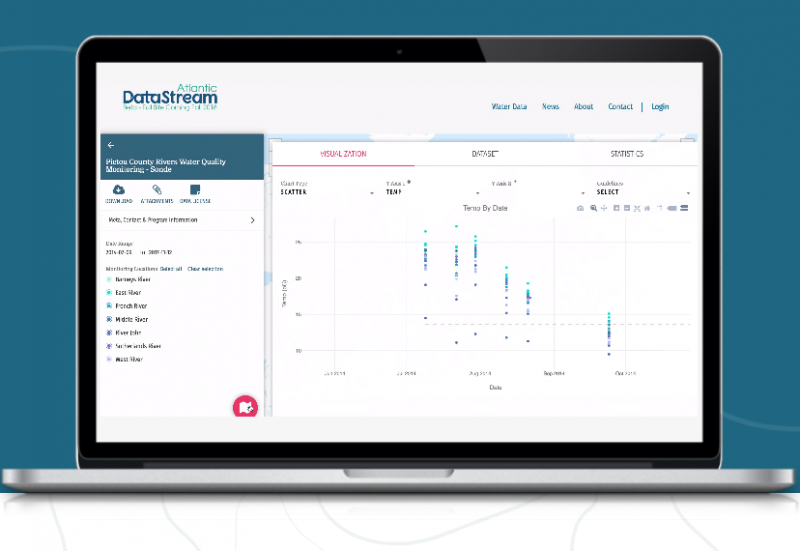Blockchain Technology Put to New Use in Freshwater Health
Published on by Water Network Research, Official research team of The Water Network in Technology
The nimble nature of community-based monitoring is being paired with the security of blockchain technology in Atlantic Canada to safeguard freshwater health.
Widespread data deficiencies are among the key findings of World Wildlife Fund Canada’s 2017 Watershed Reports, with two-thirds of Canada’s sub-watersheds data deficient for health indicators, preventing an informed understanding of the human impact in most watersheds.
While communities and stewardship organizations across Atlantic Canada have a long history of sophisticated monitoring programs, until recently they did not have a common and secure place to share their data.

Image Source: Atlantic DataStream (Print Screen)
To create that data-sharing hub, The Gordon Foundation has developed Atlantic DataStream in partnership with the Atlantic Water Network. It’s an open-access platform for data sharing that allows users to access, visualize and download full water-quality datasets collected by monitoring groups, government programs, academics and industry from Newfoundland and Labrador, New Brunswick, Prince Edward Island and Nova Scotia.
The addition of blockchain technology to this platform, supported by the RBC Foundation, provides a distributed ledger on the Ethereum network and traceability that allows users to see how data changes over time, improving the security and authenticity of data. Blockchain is completely transparent and tells users the full story of the datasets they’re working with, starting from the moment the data is first created and shared. With the click of a button, users can determine who created the datasets, whether it has changed and, most importantly, why it was collected.
Through this collective effort, the data within Atlantic DataStream is more accessible to communities, scientists and decision-makers and will play a critical role in filling data gaps and advancing evidence-based decision-making that ensures waters remain healthy for generations to come.
Sherry Campbell , president and CEO, The Gordon Foundation, said:
“Communities are connected to their waters and are best placed to see changes as they happen. Atlantic DataStream provides monitoring organizations of all sizes a place to share open-access water-quality data. This is important because rivers, lakes and watersheds don’t begin or end at regional or provincial boundaries, and neither should the scientific data that we rely on to protect them. DataStream connects people to data and encourages collaboration across jurisdictions so that policy-makers can understand what is happening upstream and downstream of them. Incorporating blockchain into Atlantic DataStream allows us to provide a level of security and transparency that does not exist in any other system for managing water data in Canada.”
Valerie Chort , vice-president corporate citizenship, RBC, and executive director, RBC-Foundation said:
“The big, pressing environmental problems of today are increasing in scope much faster than the traditional solutions used to solve them. Using a more-than-money approach, RBC is leveraging all the assets in our ecosystem, including our access to innovative technologies such as artificial intelligence and blockchain, to work together with charitable partners like WWF and The Gordon Foundation and the required experts to address and help solve our shared environmental challenges.”
Megan Leslie , president and CEO, World Wildlife Fund Canada, said:
“Just as water is a public resource, water data should be publicly accessible. But it’s not. Despite WWF-Canada’s years of work collecting data from more than 171 groups, we still don’t know how our actions are affecting most of our freshwater ecosystems and the wildlife and communities that depend on them. Here in Atlantic Canada, we are excited to be working collaboratively to fill these data gaps and gain a fuller picture of freshwater health in a way that combines community efforts, scientific expertise and state-of-the-art technology.”
Emma Wattie , director, Atlantic Water Network, said:
“Atlantic DataStream is the missing piece of the puzzle to water-data management in Atlantic Canada. Dozens of community-based monitoring groups have been actively collecting data for decades, and we now have a secure, user-friendly and open access hub to share this information. Atlantic DataStream not only provides storage of water-quality data but is a platform for communicating results and networking among groups. It’s an easily accessible database for groups to share their data with other monitoring programs and decision-makers. Atlantic Water Network is proud to be part of this innovative program and to be partnering on the first DataStream outside the Makenzie River Basin.”
Source: WWF
Media
Taxonomy
- Ecosystem Management
- River Studies
- Ecosystem Management
- Freshwater
- River Restoration
- River Engineering
- Fresh Water Ecology
- Internet of Things (IoT)
- Narrowband IoT (NB-IoT)